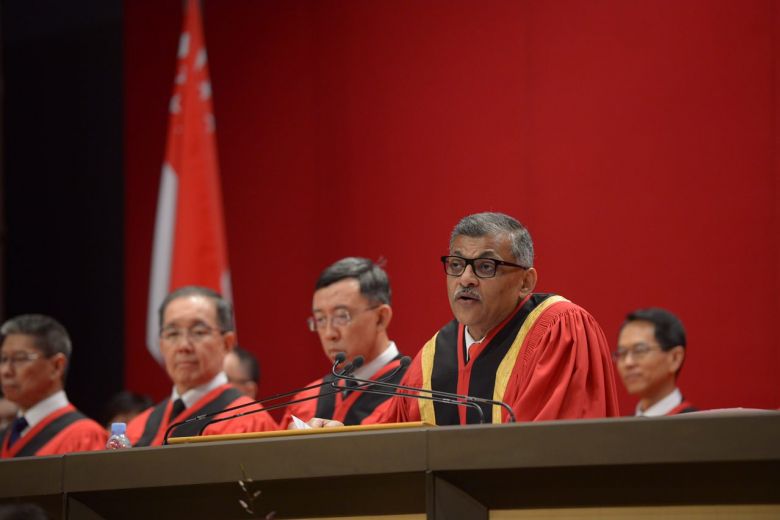Lawyer accreditation scheme extended
It will be offered to maritime, shipping lawyers with aim of raising standards
Sign up now: Get ST's newsletters delivered to your inbox

The voluntary accreditation scheme is meant to raise standards by recognising professional excellence, said Chief Justice Menon.
ST PHOTO: ALPHONSUS CHERN
A voluntary accreditation scheme will be extended to lawyers in the maritime and shipping industry, said Chief Justice Sundaresh Menon at the opening of the legal year yesterday.
Called the Specialist Accreditation Scheme, it was introduced last year as a mark of recognition and offered to building and construction lawyers in a pilot.
Since then, 24 lawyers - 13 senior and 11 junior specialists - have gained accreditation.
Announcing the extended scheme in a speech at the Supreme Court building, CJ Menon said it is meant to raise standards by recognising professional excellence.
Shipping lawyer Jude P. Benny, 60, who was on the working committee that came up with the extended scheme, said it would serve as a guide to members of the public, should they need to approach a specialist lawyer.
"It's a good thing for the public and also a good thing for law practitioners, especially the younger ones as it gives them something to aspire to," added Mr Benny.
Building and infrastructure lawyer Paul Sandosham, 47, was appointed a senior accredited specialist in the pilot scheme.
Mr Sandosham, who has 21 years of practice under his belt, said it was important for senior practitioners to lead the way and support the scheme to encourage younger lawyers to develop expertise in specialised areas of law.
The accreditation is intended to raise the standard of the legal profession and to recognise specialists in certain areas of law.
Applicants need at least five years of experience as a lawyer and will have to go through tests and interviews to determine whether they have the necessary knowledge and skills in the specialised area of law.
CJ Menon also announced the Legal Industry Framework for Training and Education, which helps lawyers plan their professional development and career goals through platforms like a mobile Web-based application.
The framework is also integrated with the national SkillsFuture initiative, which encourages lifelong learning.
In their speeches at the same event, Attorney-General Lucien Wong and Law Society of Singapore president Gregory Vijayendran also highlighted the need for legal professionals to continue learning and developing in their careers.
Mr Wong touched on the Legal Skills Competency Framework. This ensures that all legal officers in the Attorney-General's Chambers, regardless of seniority, receive the best-in-class training in areas like advocacy, advisory work, contract drafting and client engagement.
Mr Wong said: "We expect our clients' and stakeholders' requests to become more complex as their needs evolve. This will require our officers to be well versed in different skill sets to provide effective advice or representation."
In his speech, Mr Vijayendran said the Law Society - which is hosting the inaugural Cybersecurity Conference this July - has been in talks with the College of Law (Australia) to jointly develop legal education and training programmes for legal professionals here.
Announcements on the programmes are expected to be made in the first half of this year.
Mr Vijayendran said the programmes will complement the Law Society's offerings and dovetails with its training road map.
He added that it will "prepare our members for a future where lawyers require not only deep expertise in specific practice areas but also market knowledge and business skills".


